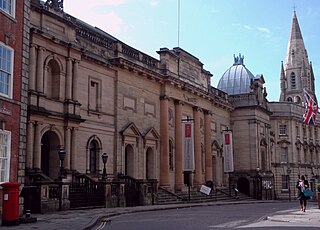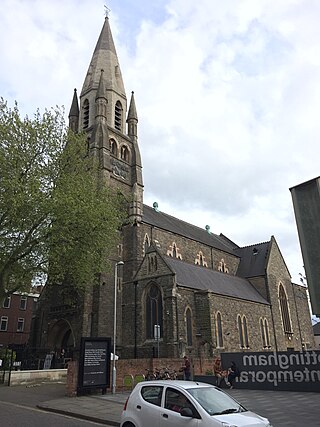
This is a list of halls of residence on the various campuses of the University of Nottingham in Nottingham, England.

Drapers' Gardens is a site in the City of London at the junction of Throgmorton Avenue and Copthall Avenue on land owned by the Drapers' Company. Originally a garden space, it was largely built over by the early 20th century. It has been the site of two major office blocks since the 1960s.

Imperial Brands plc is a British multinational tobacco company headquartered in London and Bristol, England. It is the world's fourth-largest international cigarette company measured by market share after Philip Morris International, British American Tobacco and Japan Tobacco and the world's largest producer of fine-cut tobacco and tobacco papers.

W.D. & H.O. Wills was a British tobacco manufacturing company formed in Bristol, England. It was the first British company to mass-produce cigarettes. It was one of the 13 founding companies of the Imperial Tobacco Company ; these firms became branches, or divisions, of the new combine and included John Player & Sons.

Broadgate is a large, 32-acre (13 ha) office and retail estate in the Bishopsgate area of the City of London. It is owned by British Land and GIC and managed by British Land.

John Player & Sons, most often known simply as Player's, was a tobacco and cigarette manufacturer based in Nottingham, England. In 1901 the company merged with twelve other companies to become a branch of the Imperial Tobacco Company of Great Britain and Ireland. The company pioneered the advertising with trading (cigarette) cards. As a branch, Player's continued this practice, most notably with a series devoted to the association football in the 1930s. Nowadays the brands "Player" and "John Player Special" are owned and marketed by Imperial Brands and, especially in markets external to the UK, by British American Tobacco.

The National Justice Museum is an independent museum on High Pavement in the Lace Market area of Nottingham, England.

Denton Holme is an inner city district in Carlisle, Cumbria, England. The population of this ward was 6,383 taken at the 2011 census.
The University of Nottingham operates from four campuses in Nottinghamshire and from two overseas campuses, one in Ningbo, China and the other in Semenyih, Malaysia. The Ningbo campus was officially opened on 23 February 2005 by the then British Deputy Prime Minister, John Prescott, in the presence of Chinese education minister Zhou Ji and State Counsellor Chen Zhili. The Malaysia campus was the first purpose-built UK university campus in a foreign country and was officially opened by Najib Tun Razak on 26 September 2005. Najib Tun Razak, as well as being a Nottingham alumnus, was Deputy Prime Minister of Malaysia at the time and has since become Prime Minister of Malaysia.

The Twentieth Century Society, founded in 1979 as The Thirties Society, is a British charity that campaigns for the preservation of architectural heritage from 1914 onwards. It is formally recognised as one of the National Amenity Societies, and as such is a statutory consultee on alterations to listed buildings within its period of interest.

High Pavement Chapel is a redundant church building in Nottingham, Nottinghamshire, England. It is now the Pitcher and Piano public house and is Grade II listed. It was built as, and for most of its existence operated as, a Unitarian place of worship.

The Adams Building, formerly the Adams and Page warehouse on Stoney Street, is the largest building in the Lace Market district of the city of Nottingham in England.

All Saints' Church, Rempstone is a parish church in the Church of England in Rempstone, Nottinghamshire.

Packington Hall in Staffordshire was an English country house designed by architect James Wyatt in the 18th century. Originally built for the Babington family, it became the home of the Levett family of Wychnor Hall, in that same county, until the first half of the twentieth century. The Levetts had ties to Whittington, Staffordshire and nearby Hopwas for many years.

Lichfield Court, on Sheen Road in Richmond, London, consists of two Grade II listed purpose-built blocks of flats. Designed by Bertram Carter and built in fine Streamline Moderne style, it was completed in 1935.

Highfields Park is Grade II listed park providing 121 acres (49 ha) of public space, in the west of Nottingham, England. It is owned and maintained by Nottingham City Council. It located alongside University Boulevard, adjoining the University of Nottingham's University Park campus. Due to its proximity to the university campus to the north, Highfields Park appears to be a part of the campus itself and therefore many refer to the whole area as University Park. There are historical ties between the park and the campus. The park contains a boating lake, complete with boats to hire throughout the summer months. The cascade and the stepping stones at the western end are Grade II listed. To the south of the lake the Tottle Brook, a tributary of the River Trent, flows on the surface, this brook is culverted for much of its length. At the eastern end there are children's play facilities and a pavilion with a cafe.

Smoking in the United Kingdom involves the consumption of combustible cigarettes and other forms of tobacco in the United Kingdom, as well as the history of the tobacco industry, together with government regulation and medical issues.

The Nottingham Industrial Museum is a volunteer-run museum situated in part of the 17th-century stables block of Wollaton Hall, located in a suburb of the city of Nottingham. The museum won the Nottinghamshire Heritage Site of the Year Award 2012, a local accolade issued by Experience Nottinghamshire. The Museum collection closed in 2009 after Nottingham City Council withdrew funding, but has since reopened at weekends and bank holidays, helped by a £91,000 government grant, and run by volunteers. The museum contains a display of local textiles machinery, transport, telecommunications, mining and engineering technology. There is a display of cycles, motorcycles, and motor cars. There are examples of significant lace-making machinery. It also houses an operational beam engine, from the Basford, Nottingham pumping station.

The Firestone Tyre Factory was an Art Deco building on the Great West Road in Brentford in the London Borough of Hounslow. It was designed by Wallis, Gilbert and Partners for the Firestone Tire and Rubber Company. Built on a 26–acre site, it opened in October 1928 and was the second factory to open on the Great West Road, following Hudson-Essex Motors of Great Britain Limited which opened in 1927.
Peter Foggo (1930–1993) was a British architect, who headed the team at Arup Associates which designed the first phase of development at London's Broadgate in the 1980s.


















